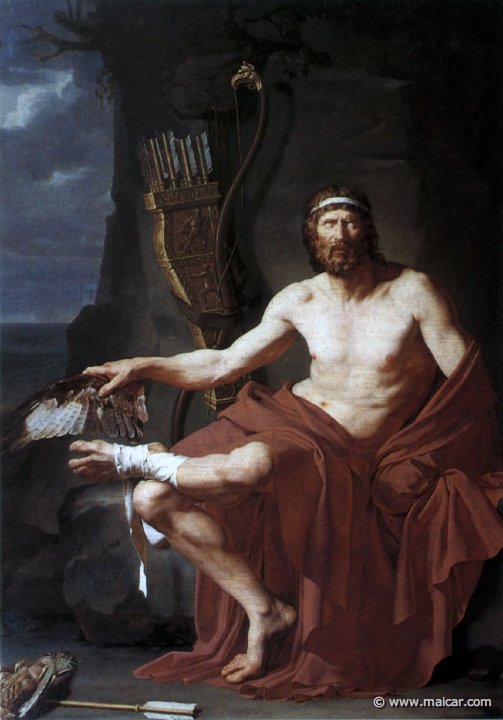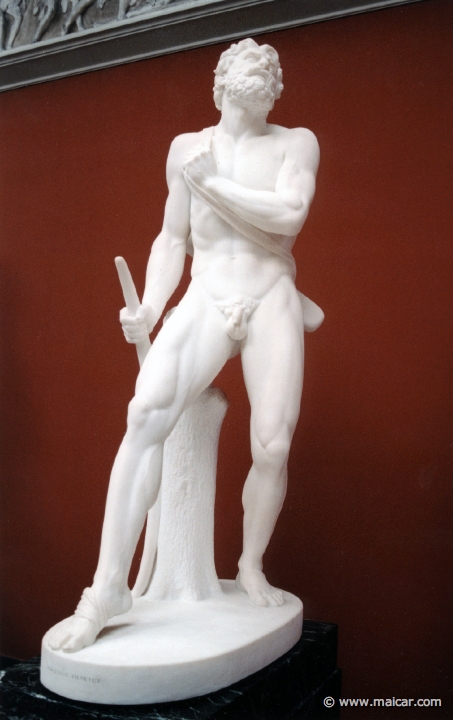|

|
The wounded Philoctetes in Lemnos. 4619: Jean Germain Drouais 1763-1788: Philoctète dans l'île de Lemnos. Musée des beaux arts, Chartres.
|
|
|
"Only Philoctetes excelled me with the bow in the land of the Trojans, when we Achaeans shot." (Odysseus to the Phaeacians. Homer, Odyssey 8.220).
"Destruction shall have end when you are dead, the author of our bane." (Philoctetes to Paris. Quintus Smyrnaeus, The Fall of Troy 10.229).
|
|
Philoctetes, who is counted among the ARGONAUTS, among the SUITORS OF HELEN,
among the ACHAEAN
LEADERS, and among those who hid inside the WOODEN HORSE, is the
archer who inherited the bow and arrows of Heracles 1. Because of
a wound he did not participate in the Trojan War during
several years, staying in the island of Lemnos. But he was
fetched by the Achaeans, and having being cured of
his wound, he killed Paris near the end of the war.
Appearance of Philoctetes
Philoctetes comes into the story at the moment
when Heracles 1 was
about to die. It is said that Heracles 1 wished to perform a sacrifice in the sanctuary at Cenaeon, which is in Euboea, and for that purpose he sent his attendant Lichas 1 to ask his wife Deianira 1 for the shirt and robe that he used to wear in his rituals. But Lichas 1, having a very long tongue, told Deianira 1 about the love affair between her husband Heracles 1 and Iole, daughter of Eurytus 4, son of Melaneus 5, son of Apollo, all of them splendid archers, being as they were guided by this god. Eurytus 4 is also known for having owned the bow that later became Odysseus', and with
which the SUITORS OF
PENELOPE were massacred.
Deianira 1 uses love-charm
So when Deianira 1 learned from Lichas 1 about her husband's fancies, she thought the time had come to make use of the supposed love-charm, which the centaur Nessus 2 had given her, and she anointed with it the shirt of Heracles 1. Now, this centaur had been hired by Heracles 1 to ferry
his wife across a river. But the CENTAURS being unreliable in these and other matters, Nessus 2 took the chance to violate the woman he was carrying on his back. However, when Heracles 1 noticed the trick, he shot the centaur with one of his arrows, which carried the poison of the Hydra, a monster killed by him years ago. The clever centaur then, feeling death coming upon him, made a charm and soaked it in his own poisoned blood, telling Deianira 1 to use it whenever she felt Heracles 1's love had
diminished. And this ridiculous tale the naïve
wife swallowed, keeping the charm to save some
future day.
Lichas 1 victim of Heracles 1's temper
Now Lichas 1, of the long tongue and the short wits, brought with him the garments, and gave them to his master. And when Heracles 1 put them
on, the toxic drug began immediately its
destructive work, corroding his skin. Now Heracles 1, who did not become famous for his good temper, ended Lichas 1's life right away, hurling him down into the Euboean sea, where he turned into a rock, as they say. But Lichas 1's death could not provide a cure for him, and he disbanded his army and crossed to Trachis, which is in Thessaly. And while his friends were dispatched to Delphi in order to receive advice, Deianira 1, seeing that the sufferings of her husband only increased, and being ashamed of her fatal error, hanged herself. The oracle at Delphi replied that Heracles 1 should be taken with all his arms to Mount
Oeta, which is in Trachinian territory between
Thessaly and Aetolia, where a huge pyre should be
built near him, leaving all other arrangements to Zeus.
Philoctetes helps Heracles 1 to die
So they did and Heracles 1, having
abandoned all hope, ascended the pyre. And resting
there, he asked every one who passed by or came up
to see him, to put torch to the pyre. But no one
wished to obey him, until Philoctetes came by. And
for having the disposition to comply with his
wishes, Philoctetes received as a gift the bow and
arrows of Heracles 1, and then lighted the pyre.
| II. Philoctetes' subsequent deeds |
|
Philoctetes acquires the bow and arrows
That is how Philoctetes came into the story, and
he not only gained Fame for helping a famous man to die, but he also acquired the weapons of the same man, who, as they say, was immediately after his death received in heaven, not leaving behind him a single bone. For Iolaus 1, his charioteer, came to gather them when the pyre was wholly consumed, and found nothing. Yet others have said that it was not Philoctetes who set a light to the pyre, but his father Poeas.
One of the ACHAEAN
LEADERS
Years after the death of Heracles 1, the
seducer Paris came to Sparta and abducted, with
or without her consent, Queen Helen, taking her to Troy. And because of this,
a powerful fleet and army gathered in Aulis in
order to sail against that city and claim Helen back. And among the ACHAEAN LEADERS who joined the coalition and fought in the Trojan War, was
Philoctetes, lord of Olizon, Meliboea, and other
Thessalian places. For he, as many other leaders,
had sworn The Oath of Tyndareus (see SUITORS OF HELEN). Philoctetes contributed with seven warships to
the alliance, but he did not reach Troy until much later, being replaced as chief by Medon 1, son of Oileus 1 and Rhene 1, and therefore brother of Ajax 2, according to some reports. Medon 1 died in the war, killed by Aeneas.
|

|
4905: Hermann Wilhelm Bissen 1798-1868: The wounded Philoctetes, 1855. Ny Carlsberg Glyptotek, Copenhagen.
|
|
Trouble in Tenedos
After putting to sea from Aulis, the Achaean
army came to the island of Tenedos, which is off
the coast of the Troad. There a number of
unpleasant things took place. For Achilles killed King
Tenes, disregarding his own mother Thetis, who had
warned him not to kill that king, or otherwise he
would himself die by the hand of Apollo, who allegedly was
Tenes' father. So when Achilles,
after losing his temper, had sent the king to
another world, the Achaeans found it necessary to
offer a sacrifice to Apollo. And while they
were offering to the god, a water-snake came out
from the altar and bit Philoctetes. Others have said that this was the tutelary snake of the nymph Chryse 2, who punished Philoctetes for having profaned the soil of the shrine, and this happened, they say, not in Tenedos but in the small island of Chryse, off the coast of the Troad, which was later overwhelmed by the waves, disappearing in the depths. Still others affirm that the snake struck Philoctetes in the island of Lemnos, and
that it was Hera who sent
it against him, the reason being that Philoctetes
alone had dared to build the funeral pyre of Heracles 1, whom Hera disliked for being the
living proof of her husband's love affair with Alcmena. In any case, the wound caused by the snake
proved to be incurable, and the stench which it
produced was so difficult to endure that the
commander in chief of the army, Agamemnon, decided to
get rid of Philoctetes, putting him ashore in the
island of Lemnos, where
the fleet came after leaving Tenedos.
Philoctetes abandoned
This is how Philoctetes, instead of fighting at Troy, spent many years in Lemnos, using the deadly
weapon he had received from Heracles 1, not to
slay Trojans but to shoot birds in the wilderness
which he turned into meals in order to survive. For
the army abandoned him, setting out but a few rags,
as though for a beggar, and leaving very little
food. As he later recalls:
"For my
stomach's needs this bow provided, bringing down
doves on the wing. And whatever my string-sped
arrow might strike, in pain I would crawl to it
myself, dragging my wretched foot behind
me." (Philoctetes to Neoptolemus.
Sophocles, Philoctetes 290).
Others say, however, that the Lemnian shepherd Iphimachus, son of Dolops 3, took care of the sick Philoctetes.
The need for his bow
As time went by, the difficulties of the
Achaeans in the war were at least as hard as the
solitude of Philoctetes. For many years had passed
and Troy could not be
taken. So in the tenth year, the seer Calchas declared that
the city would be taken if the Achaeans had the bow
and arrows of Heracles 1 fighting on their side. Others have said that
this prophecy was uttered by the Trojan seer Helenus 1 when he was
captured by Odysseus. When what had been prophesied was known to all,
the Achaeans sent Odysseus and Diomedes 2 (or as some
say Neoptolemus instead of Diomedes 2)
to fetch the bow, which they did, either through
persuasion or by force. And when the embassy (some
have said it was just Diomedes 2) had in
some way or another accomplished its mission,
Philoctetes, following the bow and the arrows,
joined the fight at Troy,
after being healed either by Podalirius or by
Machaon, both sons of Asclepius.
Those killed by Philoctetes
Some say that Philoctetes shot Acamas 3, son of the Trojan Elder Antenor 1, but others have said that Acamas 3 was killed by Meriones, the squire of King Idomeneus 1 of Crete. One Admetus 2 is also reported to have been shot by Philoctetes, and the same is said of the Trojan warriors Deioneus 3, Peirasus 2, and Medon 4, another son of Antenor 1. But his
greatest achievement in the war was the shooting of Paris, who died a painful
death because of Philoctetes' poisoned arrow.
Last adventures
After the war, Philoctetes was among those who were dispersed by the naval disaster at cape Caphareus (see Map: The
Returns). He then reached home at Meliboea in northern Hellas, but having been expelled by a sedition, he emigrated to Campania in Italy. There he fought the Lucanians, settling finally in Crimissa near Croton and Thurium, in the southern part of the country, where he founded a sanctuary of Apollo, to whom he dedicated his famous bow. And the Lucanians, they say, were of the same race as the Samnites, and were later conquered by Rome. The death of Philoctetes has not been reported.
|